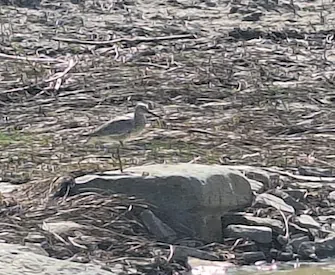It is not often you hear about exemplary father figures in the natural world, but recently on a paddle down the Red Deer River I became well acquainted with a shining example of male parental care. One of the enjoyable parts of river excursions is that you often get to see shorebirds like Sandpipers and Killdeer foraging about for invertebrates more naturally; floating canoes may appear less threatening than a walking human. The most prevalent shorebird on this trip, eyeing the canoe suspiciously, was the crow-sized, greyish- brown Willet. They are hard to spot at a distance on the camouflaged river rocks, but when they take flight, the flash of black and white stripes on their wings makes them easily distinguished. The call “pill- will-willet” that is sometimes heard also lends itself to identifying the bird, as it sounds out its own name.
Now if we want to hand out the prize for top feathered father then we should consider the lengths that the male Willets go to ensure their offspring’s success. First, when they return to their breeding ground and find their mate, the pair must find the perfect nesting site. Typically, the male forges ahead, stopping to scrape a depression with his feet, bill, and chest in what he thinks is a suitable site. The female then evaluates his work and if it is not up to her standards he continues along, making several attempts along the way. If she does approve he will scrape out the remaining depression and they will line it with grasses together. Then the female lays her four eggs in it.
The second step as a Willet dad is to defend its nest and territory from competition with fierce vocalizations and patrolling the boundaries, engaging in physical fights if necessary. This is its job during the day. At night, it is the father’s job to sit on the nest and keep it warm while brooding (over the eggs, not his day). Truly, there is never a moment of rest during nearly a month of incubation.
When the young finally hatch, both the parents will prepare them for the real world, teaching them how to hunt along the shores. They glean for invertebrates and fishes with their long narrow bills in the shallows. The parents also defend the chicks from predators, sometimes faking injuries to lead hunters away from the nest or their young. After two or three weeks the mother leaves, but the father stays with his chicks for four weeks, ensuring the best chance of success for his offspring. Does the Willet dad feel a similar sense of anxiety and pride as a human father handing over the keys to the family car as he flies away from his young for the last time?
If you want to give the Willets a wing up in being great dads, ensure that you walk very carefully along the shores and banks of rivers, marshes, and the adjoining grassland areas; scraped ground shorebird nests are extremely hard to see, while the eggs are camouflaged to look like rocks. You wouldn’t want to crush their hard work. And don’t forget to give your own great dads a hug.























